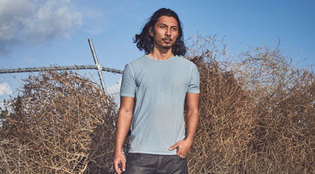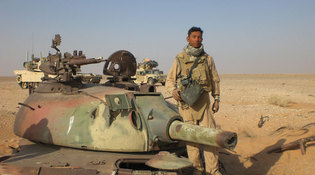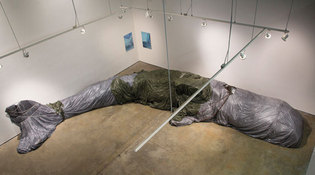 loading
loading
War and after Shaughn and JohnView full image Courtesy Joe DeVeraView full image Courtesy Joe DeVeraJoe DeVera ’14MFA (above, as a Marine) created a sculpture called The Whale while studying at the Yale School of Art. He later recognized that the piece was informed by his experience in Iraq. View full imageArtistJoe (José) DeVera ’14MFA, artist and adjunct art professor at California State University-Fullerton and Santa Ana College. Age: 33. Marine Reserves 2001–2008. Deployed to Kuwait and Iraq, January 2003, for eight months; and to Iraq in September 2007 for eight months. California artist Joe DeVera describes his 60-foot whale sculpture as an expression of “complicated sadness.” That sadness, he says, infuses all of the artwork he’s done since returning from Iraq. The ex-Marine was a second-year student at the Yale School of Art in 2013 when he built the whale’s body from cardboard boxes, discarded furniture, and “a bunch of detritus.” DeVera swathed the body with gray and green cast-off parachutes. When he exhibited The Whale at the art school studio building, the creature lay beached against two walls of the cavernous gallery. The ropes encircling its throat and tail suggested captivity. DeVera made the whale after the School of Art gave him a grant for a summer trip to Japan. He visited the Marshall Islands and witnessed the 68th anniversary of the Hiroshima bombing. Japan interested him because the mythology of World War II “is so tied to Marine Corps lore”—even though “World War II was not my war.” (DeVera hadn’t known that Iraq would be his war, either; he’d joined the Reserves at age 17 for a little college money and an adventure. The Twin Towers fell while he was in boot camp.) When he returned from Japan, “I was just kind of depressed, and for some reason, I gravitated to making this whale as this infinite symbol of loss.” He wasn’t making conscious connections to the 16 months spent as a Marine tank crewmember and commander in Iraq. “It was more kind of finding out afterward what it meant.” Eventually, he recognized that just as a beached whale is “a wayward body out of its element,” so is a fighter on foreign soil. The whale, once hunted for its oil, reminded him that “much of what happens in Iraq and the Middle East ties in with oil.” And he saw that the whale’s parachute skin resembled the shrouds that covered bodies of people killed in combat. DeVera reused the whale’s parachutes and rope for his thesis project, a horse made of wood and trash and tarps found snagged on highway fences. The sculpture, And All the King’s Men, alluded to the fact that, like the horse, a Marine or a soldier is a module, replaceable once killed; the military can calculate the monetary value of the horse or the combatant—in the case of a human being, a value, says DeVera, calculated by “how much you’re worth in equipment.” He adds that the wood he used for the animal’s legs reminded him of the human limbs lost during wars. “I’m still parsing it out,” he says. “I’m still trying to answer questions for myself.”
|
|